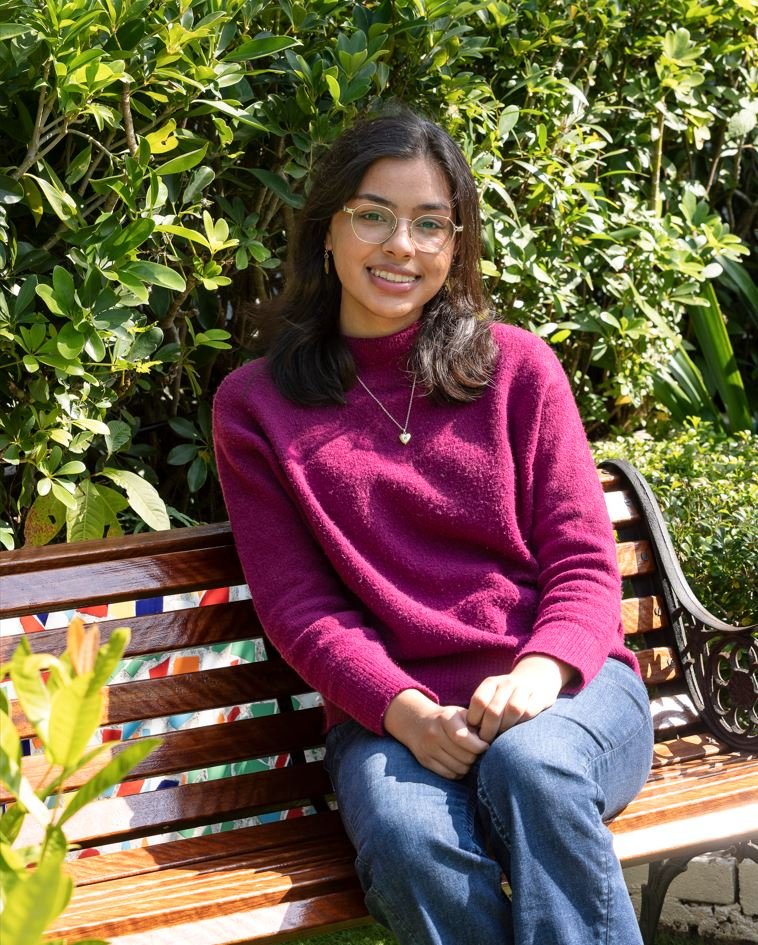Psyched For Success: The Oxbridge Experience!
Psyched For Success: The Oxbridge Experience!
This article was originally published in Around DB magazine in February 2025.
For someone who secured the highest mark in the world this year in A Level psychology (Pearson Edexcel), Aarushi Sharma is, to put it mildly, rather modest. “I got the news around three in the morning,” she says. “I was writing an essay and thinking it wasn’t going well; then I got the email. It’s not something I was aiming for, but it’s nice that it happened!”
Aarushi explains that psychology wasn’t actually one of her original A Level selections. “I wasn’t quite sure at the beginning what I wanted to go into, so I chose four A Level subjects: maths, biology, chemistry and physics. A few weeks in, I changed from physics to psychology because it seemed interesting. There was a lot to catch up on, but my teacher [at Discovery Bay International School], Mr Lennon, was amazing. He had all these sheets prepared detailing exactly what I’d missed and needed to learn, which really helped.”
It turned out to be a good swap. Aarushi found a passion for studying psychology and set about finding university courses where she could extend her knowledge. “My number one choice was always Cambridge,” she says. “I chose psychological and behavioural sciences because it’s the thing that I can study and not get tired of; I find it so interesting.”
Being an international applicant, Aarushi’s interview took place online. “I didn’t have much time to prepare,” she says, “but Ms Lau [the university and careers guidance counsellor at DBIS] was really great in organising a mock interview at short notice.” Aarushi says her subject teachers were extremely supportive too.
At first, she didn’t think things had gone well – the interview lasted some time – but the fact the questions kept coming was in fact a positive sign. “From what I’ve heard since, if you are answering questions correctly, the interviewers keep asking. If you think you didn’t do well, you probably did!” Aarushi did, and the following October she headed to the UK to begin the next chapter of her exciting educational journey.
CAMBRIDGE UNDERGRAD
One of the world’s oldest universities, Cambridge is a collegiate establishment, comprising 31 colleges. Aarushi applied to St Catharine’s, or Catz as it’s affectionately known. Renowned for being a friendly college, Catz enjoys a central location and is currently home to a community of around 1,000 students and staff. Notable alumni include Sir Ian McKellen, Jeremy Paxman and Richard Ayoade. The ‘friendly’ reputation was a big draw for Aarushi.
“I thought, OK, I’m an international student, I’m not going to know anyone there, so I’d like to go somewhere where people are going to be nice.”
It seems she made the right call. Aarushi has settled into university life well and enjoys the sense of community in her college. Cambridge traditions such as formal dinners (St Catharine’s formals feature the famous Catz cheese course!) provide a nice way to socialise, and Aarushi has joined a number of student societies. Her memberships include Tea Soc, Yarn Soc and Psych Soc, although the superpopular Bubble Tea Soc has so far evaded her. “I tried, but they were full – it’s very competitive!”
One particular group that helped support Aarushi’s transition to university in the UK was the Hong Kong Society. “They organised some events before the term started, so I ended up meeting people there.”
Originally from India, Aarushi moved to Hong Kong when she was seven. While moving to the UK after graduating school was fairly straightforward, it wasn’t without its challenges. “The hardest thing at first was the cultural difference, not in a bad way but in terms of the references people make, such as TV shows. Also the rain; I read somewhere that Cambridge is the driest place in the UK, which you wouldn’t think being there!
“I didn’t have a lot of time to think about [the move] because I was busy from the start with freshers’ week activities. It was actually more like freshers’ three days as classes then started, but it’s Cambridge – I don’t know what I was expecting!”
How has the workload been so far? “As long as you stay on top of things, you can still have a social life. We’re expected to study for around 40 hours a week, so, just like a job, which I think is pretty realistic.
“I’m doing four papers. For each paper you’re assigned a supervisor, maybe a professor or a PhD student – someone who is actively working in that field – and they set you work throughout the week. You then meet with them to discuss your work or your understanding of the material.” Aarushi says the sessions are challenging but that students get a lot out of them.
She hasn’t shied away from extras either. Apparently it’s not unusual at Cambridge for students to attend optional lectures on completely dif ferent subjects to those they are studying, simply because they seem interesting. “Everyone that goes to Cambridge is a 100% cer tified nerd,” she jokes.
THE FOUNDATIONS
Getting into Cambridge is, as you might expect, no mean feat – the university typically receives six applications per place. Studying at DBIS, following programmes based on the English National Curriculum and culminating in A Levels, helped provide Aarushi with solid grounding to support her application.
“I definitely feel that studying A Levels helped because I was able to really hone in on the subjects I cared most about,” she says. “Being able to do subjects which all complemented each other also meant that I could create connections in content across different areas; I think this helped when it came to preparing for interviews and such because I could answer questions from multiple angles.”
Rebecca Boddington, Head of Sixth Form at DBIS, explains further. “A Levels are internationally recognised qualifications that allow students to specialise in subjects they are passionate about. This specialisation can be particularly beneficial for students with clear career goals or interests they wish to pursue.
“A Levels provide a structured pathway from secondary education to higher education, emphasising independent study, research, critical thinking and the development of original thought. Additionally, A Levels can enhance the chances of international students gaining admission to top-ranking universities, as many prestigious institutions regard A Level grades as strong indicators of academic ability and potential.”
THE FUTURE
Already nearly half way through her first year at university – each academic year at Cambridge comprises three terms of eight weeks, meaning Aarushi can head home to DB fairly regularly to soak up some sun and enjoy her mum’s home cooking – Aarushi has some interesting studies coming up.
“I’m really looking forward to next year,” she says. “There’s a criminology module, which seems very interesting. I’m also looking forward to the labs and neuropsychology. I’d like to go into clinical psychology; it’s very competitive, so we’ll see, but ideally I’d like to do a 50/50 split of practice and research. I’ll probably be studying for the next eight years.”
What advice does Aarushi have for anyone thinking of applying to Cambridge? “Just apply. I almost didn’t as I didn’t think I’d get in. So many people self-select out of universities. If you don’t get in it’s fine; you’ll be in the same position you were in before, so just apply!” Wise words indeed. Maybe we’ll see a few more DB students following in Aarushi’s academic footsteps soon!


